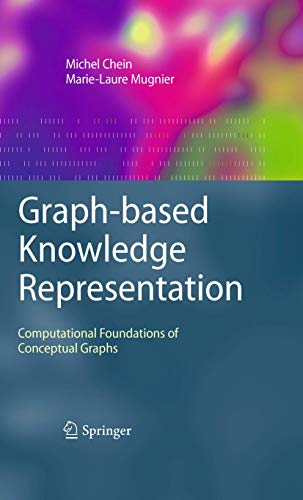Graph-based Knowledge Representation (Advanced Information and Knowledge Processing)
Chein
About the Book
Description:
Seller Inventory # hafa_Silver_1848002858
About this title:
Synopsis: This book provides a de?nition and study of a knowledge representation and r- soning formalism stemming from conceptual graphs, while focusing on the com- tational properties of this formalism. Knowledge can be symbolically represented in many ways. The knowledge representation and reasoning formalism presented here is a graph formalism – knowledge is represented by labeled graphs, in the graph theory sense, and r- soning mechanisms are based on graph operations, with graph homomorphism at the core. This formalism can thus be considered as related to semantic networks. Since their conception, semantic networks have faded out several times, but have always returned to the limelight. They faded mainly due to a lack of formal semantics and the limited reasoning tools proposed. They have, however, always rebounded - cause labeled graphs, schemas and drawings provide an intuitive and easily und- standable support to represent knowledge. This formalism has the visual qualities of any graphic model, and it is logically founded. This is a key feature because logics has been the foundation for knowledge representation and reasoning for millennia. The authors also focus substantially on computational facets of the presented formalism as they are interested in knowledge representation and reasoning formalisms upon which knowledge-based systems can be built to solve real problems. Since object structures are graphs, naturally graph homomorphism is the key underlying notion and, from a computational viewpoint, this moors calculus to combinatorics and to computer science domains in which the algorithmicqualitiesofgraphshavelongbeenstudied,asindatabasesandconstraint networks.
From the Back Cover:
This book studies a graph-based knowledge representation and reasoning formalism stemming from conceptual graphs, with a substantial focus on the computational properties.
Knowledge can be symbolically represented in many ways, and the authors have chosen labeled graphs for their modeling and computational qualities.
Key features of the formalism presented can be summarized as follows:
· all kinds of knowledge (ontology, facts, rules, constraints) are labeled graphs, which provide an intuitive and easily understandable means to represent knowledge,
· reasoning mechanisms are based on graph-theoretic operations and this allows, in particular, for linking the basic problem to other fundamental problems in computer science (e.g. constraint networks, conjunctive queries in databases),
· it is logically founded, i.e. it has a logical semantics and the graph inference mechanisms are sound and complete,
· there are efficient reasoning algorithms, thus knowledge-based systems can be built to solve real problems.
In a nutshell, the authors have attempted to answer, the following question:
``how far is it possible to go in knowledge representation and reasoning by representing knowledge with graphs and reasoning with graph operations?''
Bibliographic Details
Title: Graph-based Knowledge Representation (...
Publisher: Springer
Publication Date: 2008
Binding: Hardcover
Condition: very good
